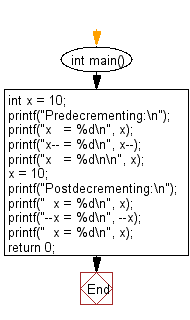C Exercises: Demonstrates the difference between predecrementing and postdecrementing using the decrement operator
C Basic Declarations and Expressions: Exercise-78 with Solution
Write a C program to demonstrates the difference between predecrementing and postdecrementing using the decrement operator --.
Sample Solution:
C Code:
#include<stdio.h>
int main()
{
int x = 10;
printf("Predecrementing:\n");
printf("x = %d\n", x);
printf("x-- = %d\n", x--);
printf("x = %d\n\n", x);
x = 10;
printf("Postdecrementing:\n");
printf(" x = %d\n", x);
printf("--x = %d\n", --x);
printf(" x = %d\n", x);
return 0;
}
Sample Output:
Predecrementing: x = 10 x-- = 10 x = 9
Flowchart:

C programming Code Editor:
Contribute your code and comments through Disqus.
Previous:Write a C program that accepts principal amount, rate of interest and days for a loan and calculate the simple interest for the loan, using the following formula.
Next: Write a C program using looping to produce the following table of values.
What is the difficulty level of this exercise?
Test your Programming skills with w3resource's quiz.
C Programming: Tips of the Day
Static variable inside of a function in C
The scope of variable is where the variable name can be seen. Here, x is visible only inside function foo().
The lifetime of a variable is the period over which it exists. If x were defined without the keyword static, the lifetime would be from the entry into foo() to the return from foo(); so it would be re-initialized to 5 on every call.
The keyword static acts to extend the lifetime of a variable to the lifetime of the programme; e.g. initialization occurs once and once only and then the variable retains its value - whatever it has come to be - over all future calls to foo().
Ref : https://bit.ly/3fOq7XP
- New Content published on w3resource:
- HTML-CSS Practical: Exercises, Practice, Solution
- Java Regular Expression: Exercises, Practice, Solution
- Scala Programming Exercises, Practice, Solution
- Python Itertools exercises
- Python Numpy exercises
- Python GeoPy Package exercises
- Python Pandas exercises
- Python nltk exercises
- Python BeautifulSoup exercises
- Form Template
- Composer - PHP Package Manager
- PHPUnit - PHP Testing
- Laravel - PHP Framework
- Angular - JavaScript Framework
- Vue - JavaScript Framework
- Jest - JavaScript Testing Framework
